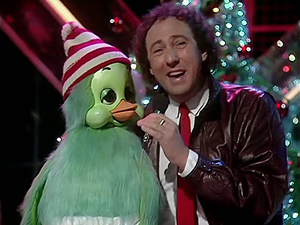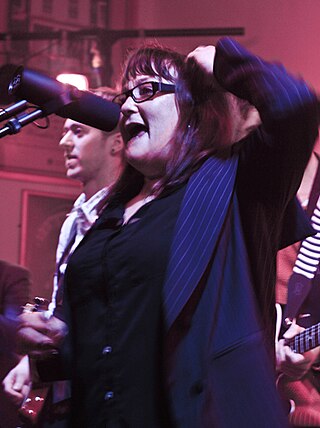Related Research Articles

Doctor Who is a British science fiction television series broadcast by the BBC since 1963. The series, created by Sydney Newman, C. E. Webber and Donald Wilson, depicts the adventures of an extraterrestrial being called the Doctor, part of a humanoid species called Time Lords. The Doctor travels in the universe and in time using a time travelling spaceship called the TARDIS, which externally appears as a British police box. While travelling, the Doctor works to save lives and liberate oppressed peoples by combating foes. The Doctor often travels with companions.

The Weakest Link is a British television quiz show, mainly broadcast on BBC Two and BBC One. It was devised by Fintan Coyle and Cathy Dunning and developed for television by the BBC Entertainment Department. The game begins with a team of nine contestants, who take turns answering general knowledge questions within a time limit to create chains of nine correct answers in a row. At the end of each round, the players then vote one contestant, "the weakest link", out of the game. After two players are left, they play in a head-to-head penalty shootout format, with five questions asked to each contestant in turn, to determine the winner.

Rolf Harris was an Australian musician, television personality, painter, and actor. He often used unusual instruments like the didgeridoo and the Stylophone in his performances, and is credited with the invention of the wobble board. He was convicted in England in 2014 of the sexual assault of four underage girls, which effectively ended his career.

The Old Grey Whistle Test was a British television music show. The show was devised by BBC producer Rowan Ayers, commissioned by David Attenborough and aired on BBC2 from 1971 to 1988. It took over the BBC2 late-night slot from Disco 2, which ran between September 1970 and July 1971, while continuing to feature non-chart music. The original producer, involved in an executive capacity throughout the show's entire history, was Michael Appleton.
Blankety Blank is a British comedy game show which started in 1979 and is still running today, albeit with some sizeable gaps.

Arena is a British television documentary series, made and broadcast by the BBC since 1 October 1975. Voted by TV executives in Broadcast magazine as one of the top 50 most influential programmes of all time, it has produced more than six hundred episodes directed by, among others, Frederick Baker, Jana Boková, Jonathan Demme, Nigel Finch, Mary Harron, Vikram Jayanti, Vivian Kubrick, Paul Lee, Adam Low, Bernard MacMahon, James Marsh, Leslie Megahey, Volker Schlondorff, Martin Scorsese, Julien Temple, Anthony Wall, Leslie Woodhead, and Alan Yentob.

Orville the Duck was the most famous puppet often used by the ventriloquist Keith Harris (1947–2015) and was named after Orville Wright.

Janice Berry, known professionally by her first married name Janice Long, was an English broadcaster who was best known for her work in British music radio. In a career that spanned five decades, she became the first woman to have her own daily music show on BBC Radio 1. She also appeared on other BBC Radio stations, such as BBC Radio 2, BBC Radio London, BBC Radio WM, and BBC Radio 6 Music, and was a regular presenter on the television chart show Top of the Pops.

Keith Shenton Harris was an English ventriloquist, best known for his television show The Keith Harris Show (1982–86), audio recordings, and club appearances with his puppets Orville the Duck and Cuddles the Monkey. He had a UK Top 10 hit single in 1982 with "Orville's Song" which reached number 4 in the charts.
This is a list of British television-related events in 2005.
Seaside Special is a European light entertainment show broadcast from 1975. It was an outside broadcast based at a big top around numerous British seaside resorts. Originally the big top belonged to various circuses, but in later seasons, the BBC bought its own to be the venue. The programme was developed by producer Michael Hurll. The series was developed after a short-lived, 6 part 'trial' aired on BBC2 in 1973, under the title Show of the Week: The Young Generation Big Top, starring the dance troupe The Young Generation and hosted by various personalities. The series was broadcast from various Pontin's Holiday Camps around the UK under the Gerry Cottle Big Top. The first show, airing on 6 August 1973, was hosted by Clodagh Rodgers. While this show was originally made in the United Kingdom, it was also co-produced in France, Switzerland and Belgium.
The Russ Abbot Show is a British television sketch comedy series which in 1980 onwards stars Russ Abbot and ran for 17 years on television before moving over to Radio 2 for a further five years.
This is a list of British television related events from 1985.
This is a list of British television related events from 1984.
Top Gear is a British motoring magazine and entertainment television programme. It is a revival by Jeremy Clarkson and Andy Wilman of the 1977–2001 show of the same name for the BBC, and premiered on 20 October 2002. The programme focuses on the examination and reviewing of motor vehicles, primarily cars, though this was expanded upon after the broadcast of its earlier series to incorporate films featuring motoring-based challenges, special races, timed laps of notable cars, and celebrity timed laps on a course specially-designed for the relaunched programme. The programme drew acclaim for its visual and presentation style since its launch, which focused on being generally entertaining to viewers, as well as criticism over the controversial nature of its content. The show was also praised for its occasionally-controversial humour and lore existing in not just the automotive community but in the form of internet memes and jokes. The programme was aired on BBC Two until it was moved to BBC One for its twenty-ninth series in 2020.
The Orville is an American science fiction comedy-drama television series created by Seth MacFarlane, who also stars as the protagonist Ed Mercer, an officer in the Planetary Union's line of exploratory space vessels in the 25th century. It was inspired primarily by the original Star Trek and its Next Generation successor, both of which it heavily parodies and pays homage to. The series also uses inspiration from the Star Wars franchise and games like the Mass Effect series. It follows the crew of the starship USS Orville on their episodic adventures, as well as a serialized story which develops over the length of the series.
This is a timeline of notable events relating to BBC Radio 1, a British national radio station which began in September 1967.
A timeline of notable events relating to BBC Radio 2, a British national radio station which began broadcasting in September 1967.
References
- ↑ "BBC Programme Index". 31 December 1982.
- ↑ "DS Icon: Orville (and Keith Harris)". Digital Spy . Retrieved 7 January 2013.
- ↑ Youde, Kate (31 July 2011). "Orville finally takes flight" . London: Independent. Archived from the original on 18 June 2022. Retrieved 7 January 2013.
- ↑ "BBC Programme Index". 31 December 1982.
- ↑ "Schedule - BBC Programme Index".
- ↑ "Schedule - BBC Programme Index".
- ↑ "Schedule - BBC Programme Index".
- ↑ "Schedule - BBC Programme Index".
- ↑ "Schedule - BBC Programme Index".
- ↑ "Schedule - BBC Programme Index".
- ↑ "Schedule - BBC Programme Index".